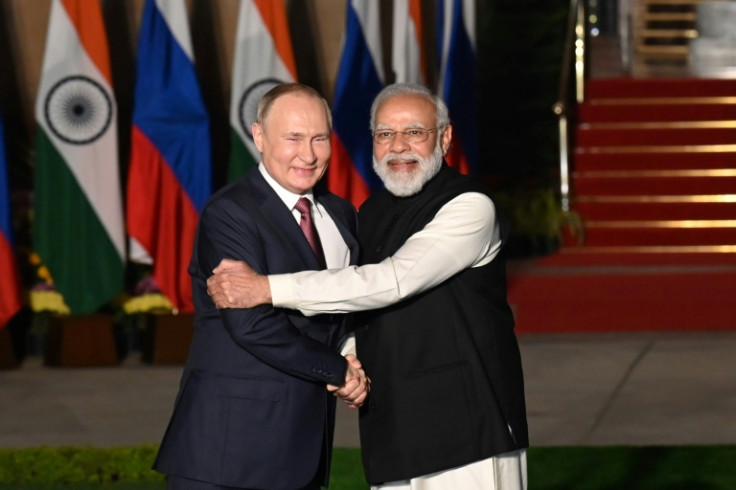Talk Of Modi-Putin Summit Shows World Ready To Turn Its Back On West Over Russia Ties

As the West's support for Ukraine weakens and its efforts to isolate Russia sputters, President Vladimir Putin is making his moves. Russian diplomacy has been working overtime to draw its Moscow's friends closer, exploiting the Global South's resentment of the West and trying to normalize relationships bruised by the Ukraine war.
And he now sees the opportunity to slow traditional friend India from drawing closer to the United States' orbit, despite New Delhi's wariness of Moscow becoming a junior partner to its arch-enemy China.
India's External Affairs Minister S. Jaishankar's five-day trip to Russia, itself a spectacular rejection of the West's attempts to isolate Putin, has led to talk of a meeting between Prime Minister Narendra Modi and Putin this year. Modi had avoided his annual summit with Putin in the last two years after Russia invaded Ukraine. But Putin may be reaching out now.
But a Modi-Putin summit, a clear signal that the non-Western world is ready to re-embrace Putin, would have to overcome a crowded political calendar: both countries are going to the polls in the first half of this year.
Putin is seeking a fifth term in March, in a poll considered nearly sealed in his favor; and Modi's Bharatiya Janata Party (BJP) is considered a clear front-runner to win India's general elections.
An opportunity for the summit will present itself when Putin hosts the first summit of the extended BRICS collective, which Modi is widely expected to attend. But that meeting is scheduled tentatively for October.
Honoured to call on President Vladimir Putin this evening. Conveyed the warm greetings of PM @narendramodi and handed over a personal message.
— Dr. S. Jaishankar (@DrSJaishankar) December 27, 2023
Apprised President Putin of my discussions with Ministers Manturov and Lavrov. Appreciated his guidance on the further developments of... pic.twitter.com/iuC944fYHq
The BRICS meeting will see, in addition to traditional members Brazil, Russia, India, China and South Africa, new members accepted last year — Iran, Saudi Arabia, United Arab Emirates, Egypt and Ethiopia — in attendance. For Putin, it offers a clear display of the eroding power of the U.S.-led western bloc of nations.
Jaishankar's Moscow visit underscored the importance that Russia and India give to what they call a "time-tested, mutually beneficial relationship." It was his seventh meeting with Russian counterpart Sergey Lavrov in a year, showing how India and Russia have worked to nurture their friendship despite Western pressure in the last two years.
Post-Russia's invasion of Ukraine in February 2022, India and China are the only major economies that have not condemned Moscow's actions.
Andrei Volodine, professor at the Diplomatic Academy and Principal Research Fellow at the Institute for Scientific Information in Social Sciences (INION), Russian Academy of Sciences, attributes the warming of ties between India and Russia to two key factors: one, he told International Business Times in emailed comments, Russia's so-called special military operation led to India "all of a sudden" becoming a genuine world power; second, economic cooperation between India and Russia, long considered a weak "leg" in their relationship, is rapidly gaining strength.
India is now Russia's second biggest trade partner after China as Moscow turned to friendly Asian economies to avoid being sqeezed by western sanctions.
New Delhi's Deft Diplomacy
While China has been openly and unabashedly thrown its support behind Russia, India has deftly navigated the geopolitical fault lines. New Delhi has been circumspect not to be seen as backing an invasion while at the same time calling for a resolution of the conflict.
India has also ignored the threat of western sanctions and gulped down cheap Russian oil, which has helped the world's most populous nation to soften the blows from a slowing world economy. Washington, keen to court New Delhi as it tries to contain China, quietly accepted India claim of a sovereign right to buy oil from any country where it is available. India imports over 80% of its crude oil and 50% of its natural gas requirements.
Even as India buys more U.S. weapons, Jaishankar and Lavrov discussed the need to enhance defense cooperation – including joint production of weapons under Modi's "Make in India" initiative. India also struck agreements on setting up additional power-generating units at its Koodankulam Nuclear Power plant in the southern state of Tamil Nadu. The plan was built with Russian help.
For India, there are clear advantages still flowing from its decades-long friendship with Russia.
© Copyright IBTimes 2025. All rights reserved.





















